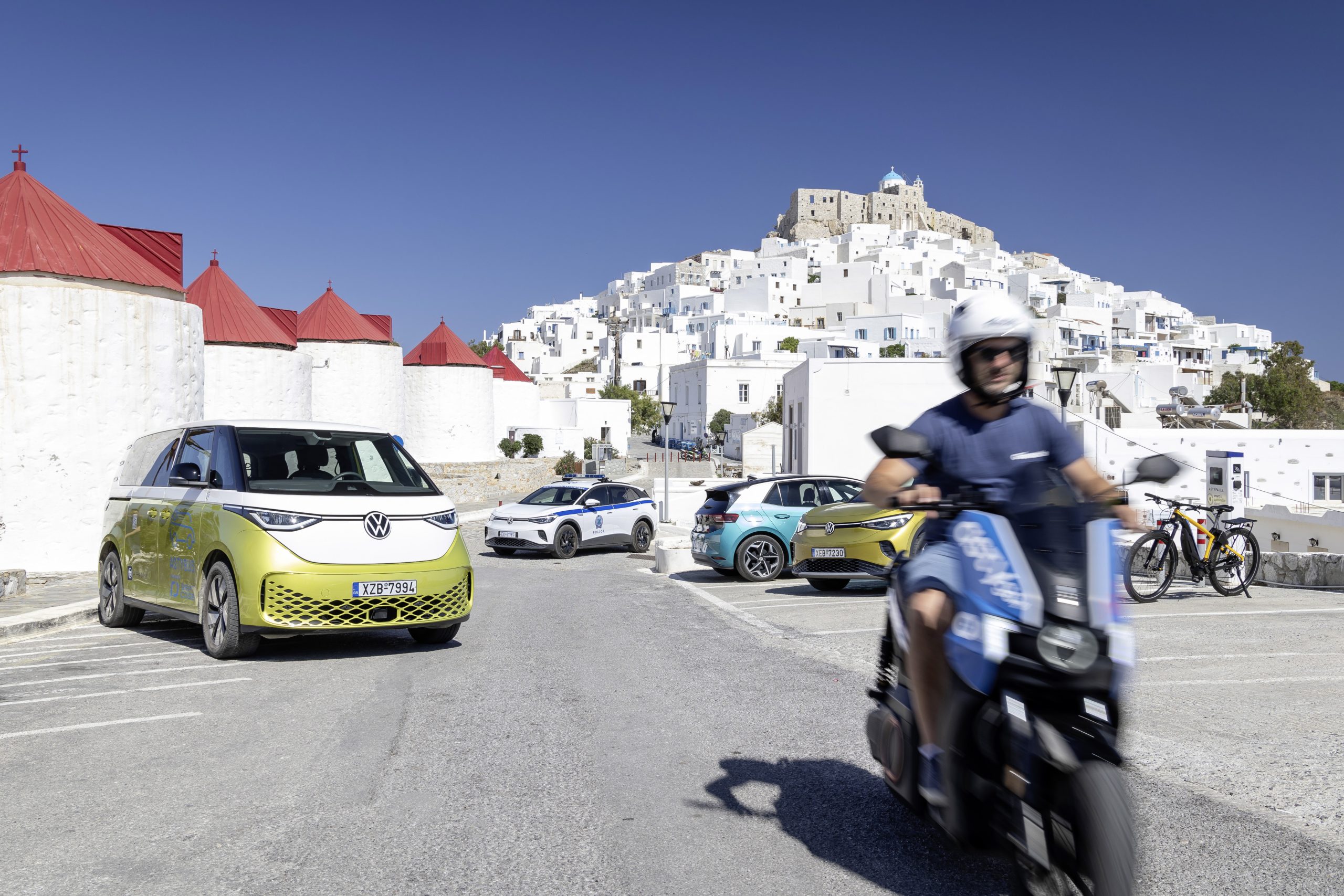 Smart, Sustainable Island-Projekt auf Astypalea
Smart, Sustainable Island-Projekt auf Astypalea
The Greek island of Astypalea serves as a future laboratory for smart, sustainable mobility. As part of a joint project between the Volkswagen Group and the Hellenic Republic, it is to be gradually converted to e-mobility, digital mobility solutions and green energy. The first interim assessment is positive: The new, digital mobility services have quickly established themselves, with a quarter of residents already regularly using the ASTYBUS ridesharing service. In the past twelve months alone, ASTYBUS has completed more than 200,000 customer kilometers. Electrification is also making progress: virtually all new cars registered on Astypalea are now pure e-cars.
The Volkswagen Group supports Astypalea with its comprehensive mobility expertise and with vehicles from the Volkswagen, Volkswagen Commercial Vehicles, Ducati and SEAT MÓ brands. The mobility transformation measures have now been almost fully implemented. These include in particular the development of the public charging infrastructure, the subsidy program for private customers and companies, the electrification of public authority vehicles of the police and airport administration, among others, and the ASTYBUS and astyGO mobility services. The number of e-vehicles on the small island has risen from zero to 84 within a short time.
The ridesharing service ASTYBUS has replaced the traditional bus line, which had offered a very limited local transport on Astypalea. Unlike the bus line, ASTYBUS operates all year round and connects many more places on the island. Depending on the season, up to five vehicles are used. Via the vehicle sharing service astyGO, customers can rent e-cars from Volkswagen as well as e-scooters from SEAT MÓ and e-bikes from Ducati. The booking is made via smartphone using the integrated astyMOVE app.
Maik Stephan, Head of Business Development at the Volkswagen Group, says: “We will also see many changes on Astypalea in other regions of Europe over the next two decades. The change in people’s mood from initial skepticism to great approval within just two years is particularly impressive. This shows that rapid transformation is possible if companies, politicians and society pull together.”
Green energy: 3.5-megawatt solar park to start in 2024
The next step is the renewal of the energy system, which will gradually be converted to locally generated, renewable electricity. So far, there are two smaller solar plants that, among other things, supply the green power for the current e-fleet. The next milestone is the construction of a hybrid energy system, which is scheduled to come online in 2024 and will consist of a solar park with 3.5 megawatts of power per year and a battery storage system. In the future, the solar farm will provide 100 percent of the energy needs for e-mobility and up to 60 percent of the island’s general energy needs. The Europe-wide tender for the energy project was recently completed.
By 2026, the energy system is to be further expanded and in the final stage will cover at least 80 percent of the total energy demand. Until now, the island has been supplied mainly with electricity from diesel generators, which emit up to 5,000 tons of CO2 per year.
Accompanying scientific study: Transformation meets with great approval
The accompanying scientific study shows a high level of approval for the transformation: 80 percent of people on Astypalea view e-mobility and mobility services positively. This is a significant improvement on the first survey at the start of the 2021 project and shows the importance of sound education about new technologies and services. The ASTYBUS ridesharing service is particularly well rated, with 97 percent approval. Among other things, the flexible use in combination with favorable prices is appreciated.
The survey also shows that on Astypalea, cost in particular is a decisive factor for switching to the e-car. The charging infrastructure, on the other hand, is no longer seen as an obstacle. The surveys took place in two waves in winter 2022/23 and summer 2021, with a total of 211 and 221 people participating, respectively. The study is being conducted by researchers from the University of the Aegean (Greece) and the University of Strathclyde (Scotland) and will accompany the project for several years.
<Published in the current issue of eMove360° magazine in german language. Order free download PDF or print version in the store.>